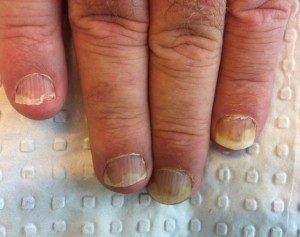My lack of options with Psoriatic Arthritis

These patients are frustrated. I am too.
In the last week, I’ve been reminded how difficult it can be to treat this disease.
In some, it’s severe and hard to control with whatever we throw at it.
In others, it’s an irritating, grumbling disease where it’s hard to control with simple medication and yet, not severe enough to consider (or to access) stronger medication with potentially more risk of side effects.
In addition, medication may help one aspect of the disease but since psoriatic arthritis can present in so many other ways, it may not help the other manifestations.
Patient 1:
She has had 20-odd years of disease, and has patiently tried all conventional disease-modifying agents (DMARDS) and has now trialled 4 different TNF-inhibitor medications (read more about biologic medications in this here). The disease remains uncontrolled. Skin is worsening. Joints are tender with intermittent swelling. We’re not happy.
Patient 2:
He has a swollen right big toe and a swollen left 5th toe. They look like sausages. All blood tests are normal and he is otherwise well apart from some thickened psoriatic skin plaques on the shins. It’s however painful to walk.
Methotrexate, Salazopyrin EN, Leflunomide, a number of anti-inflammatory medication as well as steroid has been trialled without success. He does not qualify for subsidised TNF-inhibitor therapy in his current state. I’m also not too sure I would like to use these agents for 2 sausage-shaped toes, if there were better options.
Patient 3:
15 years of mild skin psoriasis but in the last 5 years of so, he has developed painful heels (plantar fasciitis), recurrent shoulder impingement symptoms, a bad back which is quite stiff when he sits too long or when he wakes up. And most irritatingly, ugly fingernails (read this post on psoriatic nail disease). Side effects occurred with Methotrexate and Leflunomide. Blood tests are all normal and again, on the basis of this range of symptoms, this patients does not qualify for subsidised
TNF-inhibitor therapy.
An irritating lack of options. I’ve not done an audit, so my educated guess is that up to 30% of those I see with psoriatic arthritis fall into this annoying space.
I do realise complaining about lack of access to newer medications available in other countries is a 1st world complaint.
Still, I would really like access to other agents for my patients caught in these difficult situations.
Apremilast, an oral medication and Ustekinumab, a subcutaneous injection are options which should become available soon-ish. And there are more options coming with different modes of action so the future at least holds some promise.
Are you in a similar situation? I’d love to hear your thoughts.



